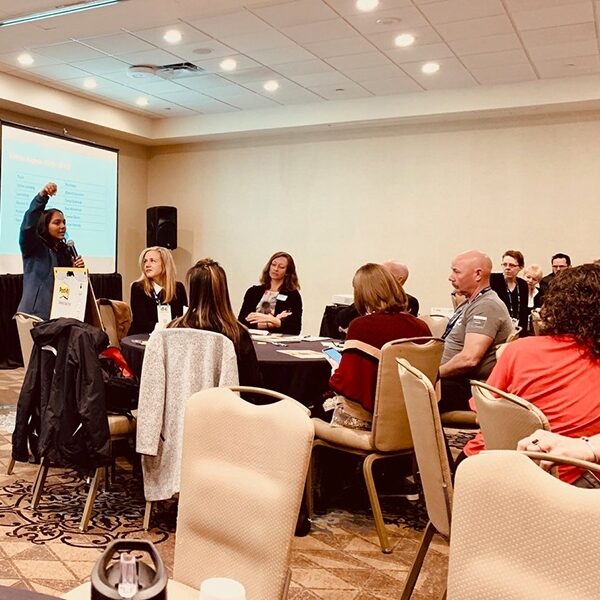
This post was originally published on the Digital Learning Collaborative blog.
The inaugural Digital Learning Annual Conference (DLAC) took place on April 1-3, 2019, and one of the highlights of the event for me was the prominent and focused conversation around research and evidence. In fact, DLAC kicked off with a research community meeting, which attracted almost 50 attendees representing roles from across the digital learning sector. Teachers, administrators, policy makers, service providers, developers, and, of course, researchers attended the meeting to learn more about the existing evidence, as well as how to better connect research and practice.
The meeting itself consisted of several rounds of small-group discussions (some topic-based, and some question-based) and sharing of funding opportunities for researchers and practitioners alike to advance the evidence-base on digital learning. I noticed five major themes emerging from the conversations that morning.
Data
Several of the conversations surfaced the need for more actionable, timely data to be translated into information that teachers can use in their learning environments. Several attendees agreed that data are plentiful, especially in digital learning settings, but those data are either received too late or are not sufficiently actionable in their raw form to be used instructionally. Another data issue that was raised was that of interoperability or lack thereof. If teachers have a more streamlined way of accessing the data they already have available, their ability to use those data to inform instructional decisions can increase substantially. Researchers and practitioners alike expressed interest in turning these data into relevant, timely recommendations that can improve students’ learning experiences.
Teachers
Along those lines, many conversations turned to the role of teachers and how to empower them given that they typically have a longer tenure in a school than either students or administrators. As the most stable presence in classrooms, attendees discussed the need for professional learning that included evidence-based practices, along with the need for more accessible, actionable research throughout the field. There was also discussion about how best to equip teachers to conduct their own micro- or action research in classrooms to allow them to make data-informed decisions and to further engender a culture of evidence-informed practice.
Leaders
Multiple attendees also mentioned the critical role of leaders in getting evidence-based practices into learning environments, or in building the evidence base itself. Somewhat unsurprisingly, at a conference focused on digital learning, the research-practice discussions focused more on people than on technology. Leaders, in particular, have the ability to prioritize evidence-based practices through multiple means. For instance, leaders are able to support and oversee teacher development, ensuring resources are directed toward systems that enable teachers to implement evidence-based practices in their classrooms.
Outcomes
A final thread that spanned several discussions raised the question of how best to measure learning, both of academic and nonacademic skills. Often, the outcomes practitioners are most interested in and would find most valuable instructionally do not have reliable and valid assessments to measure them. This is true of academic outcomes and even truer of the nonacademic skills that are core to students’ success in school and life.
Moving Forward
Attendees at the research community preconference meeting suggested that there is a need for intermediary organizations and funding to drive the deeper connection of research and practice. Facilitators and attendees shared funding opportunities specifically designed to grow the evidence base and increase the implementation of evidence-based practices in digital learning environments.
The Digital Learning Collaborative (DLC) is spearheading one of these opportunities through its Fellows Program, which was launched at the conference. If you would like to learn more about this exciting initiative, please visit the DLC website.
We left the DLAC research community meeting energized and ready – not just for the conference itself and all of the learning and connections to be had there, but also the opportunity to dig into the work of more meaningfully connecting research and practice to support digital learners across the country.

